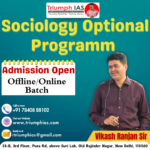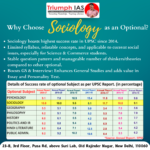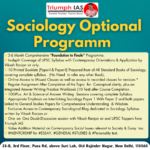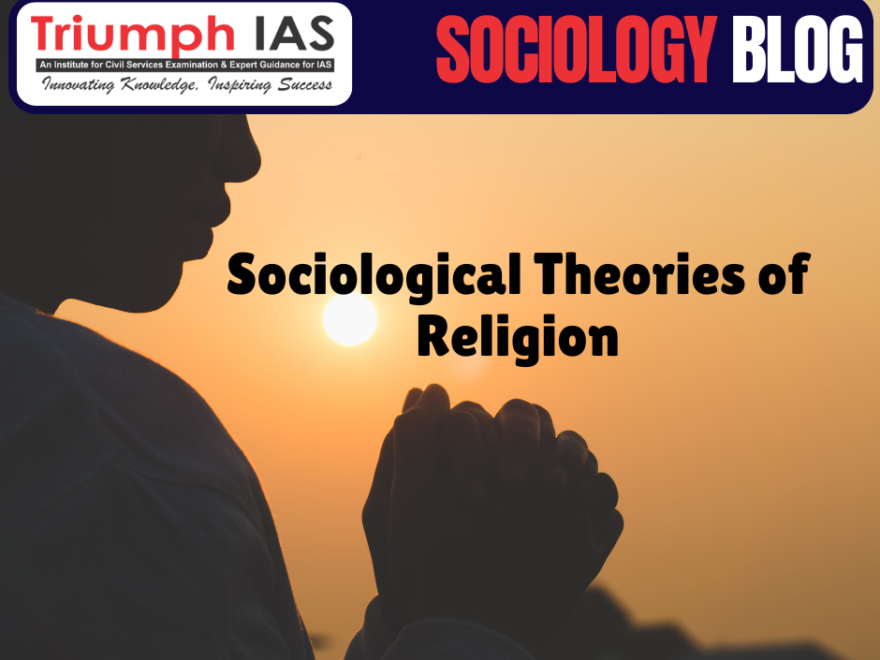Sociological Theories of Religion
The study of religion is a challenging enterprise which place quite special demands on the sociological imagination. In analyzing religious practices, we have to make sense of the many different beliefs and rituals found in the various human cultures. We must be sensitive to ideals that inspire profound conviction in believers, yet at the same time take balanced view of them. We have to confront ideas that seek the eternal, while recognizing that religious groups also promote quite mundane goals – such as acquiring finance or soliciting for followers. We should not only recognize the diversity of religious beliefs and modes of conduct, but also probe into the nature of religion as a general phenomenon.
Sociologist define religion as a cultural system of commonly shared beliefs and rituals that provides a sense of ultimate meaning and purpose by creating an idea of reality that is sacred, all-encompassing and supernatural. There are three key elements in this definition:
- Religion is a form of culture. Culture consists of the shared beliefs, values, norms and ideas that create a common identity among a group of people. Religion shares all of these characteristics.
- Religion involves beliefs that take the form of ritualized practices. All religions thus have a behavioural aspect – special activities in which believers take part and that identify them as members of the religious community.
- Perhaps most important, religion provides a sense of purpose – a feeling that life is ultimately meaningful. It does so by explaining coherently and compellingly what transcends or overshadows everyday life, in ways that other aspects of culture (such as an educational system or a belief in democracy) typically can not.
What is absent from the sociological definition of religion is as important as what is included: nowhere is there mention of god. In common sense we often think of theism, a belief in one or more supernatural deities (the term originates from the Greek word for God), basic to religion, but this is not necessarily the case. Some religions, such as Buddhism, believe in the existence of spiritual forces rather than a particular God.
How sociologists think about religion:
- Sociologists are not concerned with whether religious beliefs are true or false. From a sociological perspective, religions are regarded not as being decreed by god. But as being socially constructed by human beings. As a result, sociologists put aside their personal beliefs when they study religion.
- They are concerned with the human rather than the divine aspects of religion. Sociologists ask;
- How is the religion organized?
- What are its principal beliefs and values?
- How is it related to the larger society?
- What explains its success or failure in recruiting and retaining believers?
- Sociologists are especially concerned with the social organization of religion. Religions are among the most important institutions in society. They are a primary source of the most deep-seated norms and values. At the same time, religions are typically practiced through an enormous variety of social forms (source of diversity in society). Within Christianity and Judaism, for example, religious practice often occurs in formal organizations, such Asian religions as
- Hinduism and Buddhism, where religious practices are likely to occur in the home or some other natural setting. The sociology of religion is concerned with how different religious institutions and organizations actually function. In modern industrial society, however, religions have become established in separate, often bureaucratic, organizations, and so sociologists focus on the organizations through which religions must operate in order to survive (Hammond 1992).
- Sociologists often view religions as a major source of social solidarity. To the extent that religions provide believers with a common set of norms and values, they are an important source of social solidarity. Religious beliefs, rituals and bonds help to create a ‘moral community’ in which all members know how to behave towards one another (Wuthnow 1988). If a single religion dominates in society, there is stability. If a society’s members adhere to numerous competing religions difference may lead to destabilizing social conflicts. Recent examples of religious conflict within a society include struggles between Sikhs, Hindus and Muslims in India; clashes between Muslims and Christians in Bosnia and other parts of the former Yugoslavia; and ‘hate crimes’ against Jews, Muslims and other religious minorities in the United States.
- Sociologists tend to explain “the appeal of religion” in terms of “social forces rather than in terms of purely personal, spiritual or psychological factors”. For many people, religious beliefs are a deeply personal experience, involving a strong sense of connection with forces that transcend everyday reality. Sociologists do not question the depth of such feelings and experiences, but they are unlikely to limit themselves to a purely spiritual explanation of religious commitment.
Some researchers argue that people often ‘get religion’ when their fundamental sense of a social order is threatened by economic hard ship, loneliness, loss or grief, physical suffering, or poor health (Berger 1967); explaining the appeal of religious movements, sociologists are more likely to focus on the problems of the social order than on the psychological response of the individual.
Karl Marx’s theory of religion:
Karl Marx, the German scholar, has provided a conflict perspective of religion. Marx saw religion as a reflection of society (not as an expression of “primitive” or psychological needs as other theorists of his time presented). Unlike theorists like Durkheim who emphasized the positive functions of religion, Marx stressed the dysfunctions of religion as a social institution? Whereas Durkheim saw religion as benefiting all segments of society by promoting social commitment, Marx saw religion as serving the interests of the ruling class at the expense of the powerless masses.
- Marx argued that “religion is the sigh of the oppressed creature, the sentiment of a heartless world, and the soul of soulless conditions. It is the opium of the people”.
- Marx argued that “just as a ‘painkiller’ masks the symptoms of disease, silencing the sick person into the illusory belief that he or she is well and hearty, ‘so religion masks the exploitation of workers, and lulling them into the false belief that existing social arrangements are just-or if not just, inescapable”.
- Thus Marx argued that religion as a social institution teaches that the individual’s position on earth will be rewarded in heaven. In so doing, religion obscures the exploitative tendencies hidden within the class structure and elite’s vested interest in the status quo.
- In this way, religion becomes a tool in the hands of the ‘haves’ to exploit and oppress the ‘have-nots’.
- Marx perceived religion as ‘the personification of alienation’: the self estrangement people experience when they feel they have lost control over social institutions. The term ‘alienation’ was used by him to describe the modern worker’s experience of being nothing more than a ‘cog in a machine’. He also employed this concept to describe what he saw as the dehumanizing effect of religion. ‘The more the worker expends himself in work, the more powerful becomes the world of objects which he creates in the face of himself, the poorer he becomes in his inner life, the less he belongs to himself. It is just the same as in religion. ‘the more of himself man attributes to god the less he has left in himself’ wrote Marx .
- As the above quoted citations indicate Marx’s denunciation and rejection of religion in society was total. He argued that only when people give up the illusory happiness of religion will they begin to demand real happiness.
- In furthering his attack on religion as an exploitative social institution in the clutches of the bourgeois class, he wrote: ‘The institution of religion disillusions man so that he will think, act and fashion his reality as a man who has… regained his reason”. He predicted that in a classless society with communistic form of economic order, religion would become irrelevant and unnecessary. Like the capitalist class itself, religion would die its natural death.
Thus, Karl Marx considered religion as an uncalled for and manipulative institution forming an integral part of the exploitative superstructure. Both the religious and cultural institutions transform with the transformation of the economic foundation or the base. Religion and culture are the result of the existing power structure of society and religion would wither away once the class society revolutionizes itself into a classless society.
Functionalism and religious ritual:
In contrast to Marx, Emile Durkheim spent a good part of his intellectual career studying religion. Concentrating particularly on religion in small-scale, traditional societies, Durkheim’s work, “the Elementary Forms of the Religious Life”, is the one of the most influential studies in the sociology of religion. Durkheim does not connect religion primarily with social inequalities or power but relates it to the overall nature of the institutions of a society. He bases his work on a study of totemism as practiced by Australian Aboriginal societies, and he argues that totemism represents religion in its most ‘elementary’ or simple form – hence the title of his book.
- A totem was originally an animal or plant taken as having particular symbolic significance for a group. It is a sacred object, regarded with veneration and surrounded by various ritual activities. Durkheim defines religion in terms of a distinction between the sacred and the profane. Sacred objects and symbols, he holds, are treated as apart from the routine aspects of existence, which are totemic animal or plant, except on special ceremonial occasions, is usually forbidden, and as a sacred object the totem is believed to have divine properties which separate it completely from other animals that might be hunted, or crops gathered and consumed.
- Why is the totem sacred? According to Durkheim, it is because it is the symbol of the group itself; it stands for the values central to the group or community. The reverence which people feel for the totem actually derives from the respect they hold for central social values. In religion, the object of worship is actually society itself.
- Durkheim strongly emphasized that religions are never just a matter of belief. All religion involves regular ceremonial and ritual activities in which a group of believers meets together….. In collective ceremonials a sense of group solidarity is affirmed and heightened. Ceremonials take individuals away from the concerns of profane social life into an elevated sphere, in which they feel in contact with higher forces, attributed to totems, divine influence or goods, are really the expression of the influence of the collectivity over the individual.
- Ceremony and ritual, in Durkheim’s view, are essential to binding the members of groups not only in regular situations of worship, but also in the various life crises when major social transitions are experienced – for example, birth, marriage and death. In virtually all societies, ritual and ceremonial procedures are observed on such occasions. Durkheim reasons that collective ceremonials reaffirm group solidarity at a time when people are forced to adjust to major changes in their lives. Funeral rituals demonstrate that the values of the group outlive the passing of particular individuals, and so provide a means for bereaved people to adjust to their altered circumstances. Mourning is not the spontaneous expression of grief or, at least, it is only so for those personally affected by the death. Mourning is a duty imposed by the group.
- In small traditional cultures, Durkheim argued, almost all aspects of life are permeated by religion. Religious ceremonials both originate new ideas and categories of thought and reaffirm existing values. Religion is not just a series of sentiments and activities; it actually conditions the modes of thinking of individuals in traditional cultures. Even the most basic categories of thought, including how time and space are thought of, were first framed in religious terms. The concept of ‘time’, for instance, was originally derived from counting the intervals involved in the religious ceremonials.
- With the development of modern societies, Durkheim believed, the influence of religion wanes. Scientific thinking increasingly replaces religious explanation, and ceremonial and ritual activities come to occupy only a small part of individuals’ lives. Durkheim agrees with Marx that traditional religion – that is, religion involving divine force or gods – is on the verge of disappearing. “The old gods are dead’, Durkheim writes. Yet he says that there is sense in which religion, in altered forms, is likely to continue. Even modern societies depend for their cohesion on rituals that reaffirm their values; new ceremonial activities can thus be expected to emerge to replace the old. Durkheim is vague about what these might be, but it seems that he has in mind the celebration of humanist and political values such as freedom, equality and social cooperation
- Many other Social scientists, apart from Durkheim have analyzed religion in terms of what it does for the individual, community or society through its functions and dysfunctions. Many of these social scientists are known to belong to the tradition of functionalist thought. A famous social anthropologist of early twentieth century, Malinowski., saw religion and magic as assisting the individual to cope with situations of stress or anxiety. Religious ritual, according to him, may enable the bereaved to Reassert their collective solidarity, to express their common norms and values upon which the proper functioning of the community depends. Religion can also supplement practical, empirical knowledge,, offering some sense of understanding and control in areas to which such knowledge does not extent.
- Radcliffe-brown argues that; Religious ceremonies, for example in the form of communal dancing, promoted unity and harmony and functioned to enhance social solidarity and the survival of the society. Religious beliefs contained in myths and legends, he observes, express the social values of the different objects which have a major influence on social life such as food, weapons, day and night etc. They form the value consensus around which society is integrated.
- Recently functionalism while retaining this notion that religion has a central role in maintaining social solidarity has rejected Durkheim’s view that religious beliefs are merely symbolic representations of society. Kingsley Davis argues that religious beliefs form the basis for socially valued goals and a justification of them. Religion provides a common focus for identity and an unlimited source of rewards and punishments for behaviour.
- Functionalist theories of religion face a problem in the apparent decline in religious belief and participation. What is viewed as secularization in other theories is seen as simply religious change in functionalist terms. Functionalist theorists argue that religion takes different forms in apparently secular societies: it is more individualized, less tied to religious institutions. The character of modern industrial capitalist society, particularly its rampant individualism, is thus seen to be expressed in the differentiated character of religion in a society like the USA. Although seemingly having little basis for integration, the celebration of individualism is itself an integrating feature of such diverse religious forms. Moreover, new and distinctive forms of religion may perform latent functions for the system by deflecting adherents from critical appraisal of their society and its distribution of rewards.
- In anti-religious societies such as some communist states this argument cannot hold, but here it is claimed that functional alternatives to traditional religion operate. Other systems of belief such as communism itself fulfil the same role as religion elsewhere. National ceremonial, ritual celebration of communist victories, heroes, etc., meets the same need for collective rites, which reaffirm common sentiments and promote enhanced commitment to common goals.
- Finally, even in highly secularized western societies civil religion exists. This consists in abstract beliefs and rituals, which relate society to ultimate things and provide a rationale for national history, a transcendental basis for national goals and purposes.
- Robert king Merton, a twentieth century functionalist, introduced the concept of dysfunction. Talking about religion, for instance, he pointed out the dysfunctional features of religion in a multi-religious society. In such a society religion, instead of bringing about solidarity, could become the cause of disorganization and disunity.
- Apart from Merton, many other social thinkers have highlighted the dysfunctions of religion. Karl Marx regarded religion as a source of false consciousness among the proletariat, which prevents the ‘class for itself’ from developing. It prevents them from developing their real powers and potentialities.
Max weber’s theory of religion:
Durkheim based his arguments on a very small range of examples, even though he claims his ideas apply to religion in general. Max weber, by contrast, embarked on a massive study of religions worldwide. No scholar before or since has undertaken a task of such scope. Most of his attention was concentrated on what he called the world religions – those that have attracted large numbers of believers and decisively affected the course of global history. He made detailed studies of Hinduism, Buddhism, Taoism and ancient Judaism and in the protestant ethnic and the spirit of capitalism and elsewhere, he wrote extensively about the impact of Christianity on the history of the West. He did not, however, complete his projected study of Islam.
- Weber’s writings on religion differ from those of Durkheim in that they concentrate on the connection between religion and social change, something to which Durkheim gave little attention. They contrast with the work of Marx because weber argues that religion is not necessarily a conservative force; on the contrary, religiously inspired movements have often produced dramatic social transformations. Thus Protestantism – was the source of the capitalistic outlook found in the modern West. The early entrepreneurs were mostly Calvinists. Their drive to succeed, which helped initiate western economic development, was originally promoted by a desire to serve god. Material success was for them a sign of divine favour.
- His discussion of the impact of Protestantism on the development of the west is part of a comprehensive attempt to understand the influence of religion on social and economic life in carrying cultures. Analysing the Eastern religions, Weber concluded that they provided insuperable barriers to the development of industrial capitalism, such as took place in the West. This is not because the non-Western civilizations are backward; they have simply accepted values different from those which came to predominate in Europe. In traditional China and India, Weber pointed out, there was at certain periods a significant development of commerce, manufacture and urbanism, but these did not generate the radical patterns of social change involved in the rise of industrial capitalism in the West. Religion was a major influence in inhibiting such change.
- For example, Hinduism is what Weber called on ‘other-worldly’ religion. That is to say, its highest values stress escape from the toils of the material world to a higher plane of spiritual existence. The religious feelings and motivations produced by Hinduism do not focus on controlling or shaping the material world. On the contrary, Hinduism sees material reality as a veil hiding the true concerns to which humankind should be oriented. Confucianism also acted to direct effort away from economic development, as this came to be understood in the West, emphasizing harmony with the world rather than promoting active mastery of it. Although China was for a long while the most powerful and culturally most developed civilization in the world, its dominant religious values acted as a brake on a strong commitment to economic development for its own sake.
- Weber regarded Christianity as a salvation religion, involving the belief that human beings can be ‘saved’ if they adopt the beliefs of the religion and follow its moral tenets. The notions of sin and of being rescued from sinfulness by God’s grace are important here. They generate a tension and an emotional dynamism essentially absent from the Eastern religions. Salvation religions have a ‘revolutionary’ aspect. While the religions of the East cultivate an attitude of passivity in the believes towards the existing order, Christianity involves a constant struggle against sin, and hence can stimulate revolt against the existing order of things. Religious leaders – like Jesus – arise, who reinterpret existing doctrines in such a way as to challenge the prevailing power structure.
Critical assessment of the classical views:
- Marx, Durkheim and Weber each identified some important general characteristics of religion, and in some ways their views complement one another. Karl Marx seems to be right to claim that religion often has ideological implications, serving to justify the interests of ruling groups at the expense of others: there are innumerable instances of this in history. Take as an example the influence of Christianity on the European colonialists’ efforts to subject other cultures of their rule. The missionaries who sought to convert ‘heathen’ peoples to Christian beliefs were no doubt sincere, yet the effect of their teachings was to reinforce the destruction of traditional cultures and the imposition of white domination. The various Christian denominations almost all tolerated, or endorsed, slavery in the United States and other parts of the world up to the nineteenth century. Doctrines were developed that claimed slavery was based on divine law, disobedient slaves being guilty of an offence against God as well as their masters.
- Yet Max weber was certainly correct to emphasize the unsettling, and often revolutionary, impact of religious ideals on pre-established social orders. For example, Despite the churches’ early support for slavery in the United States, many church leaders later played a key role in the fight to abolish it. Religious beliefs have promoted many social movements seeking to overthrow unjust system of authority, playing a prominent part, for instance, in the civil rights movements of the 1960s in the United States.
- Religion has also influence social change – often provoking much bloodshed – through the armed clashes and ward fought for religious motives. For example, Khalistan movement, ISIS etc.
- These divisive influences of religion, so prominent in history, find little mention in Durkheim’s work. Durkheim emphasized above all the role of religion in promoting social cohesion. Yet it is not difficult to redirect his ideas towards explaining religious division, conflict and change as well as solidarity. After all, much of the strength of feeling which may be generated against other religious groups drives from the commitment to religious values generated within each community of believers.
- Among the most valuable aspects of Durkheim’s writings is his stress on ritual and ceremony. All religions involve regular assemblies of believers, which ritual activities also mark the major transitions of life – birth, entry to adulthood (rituals associated with puberty are found in many cultures), marriage and death (Van Gennep 1977).
The End of the Blog : Sociological Theories of Religion

|






















One comment